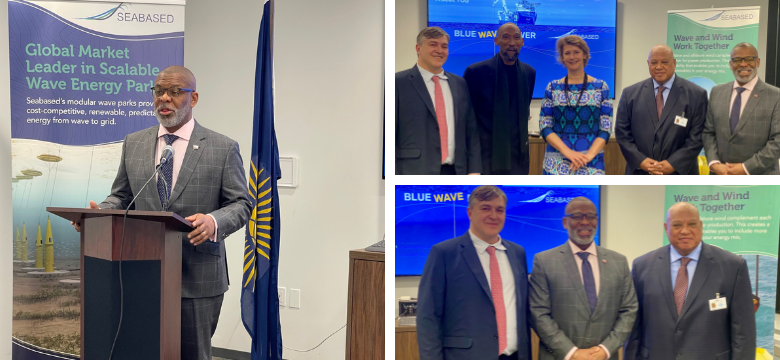
Recently, Deputy Premier and Minister of Home Affairs, the Hon. Walter Roban, JP, MP, convened with His Lordship Albert Vaea, Minister of Internal Affairs for His Majesty’s Government of the Kingdom of Tonga and His Excellency Va´inga Tōnē, Chair of SIDS DOCK Executive Council, met Tuesday (14 March) in New York with Small Island Developing States (SIDS) Ambassadors and Permanent Representatives to the United Nations who are members of the SIDS DOCK – the SIDS Sustainable Energy and Climate Resilience organization to discuss the promise of Seabased wave energy technology as a solution for small island states’ energy insecurity, debilitating fuel costs, and renewable transition challenges.
His Excellency Va´inga Tōnē added his signature to a Memorandum of Understanding (MoU) that was signed in February between His Majesty’s Government of the Kingdom of Tonga, SIDS DOCK and Seabased to develop a 10MW Wave Power Park in Tongatapu, Tonga.
Bermuda Leads the Way
Minister Roban shared his experience helping to shepherd a planned utility-scale wave energy park with Seabased in Bermuda, speaking of Bermuda’s role, blazing a trail in terms of finance, planning, and creating a regulatory sandbox that other island states can use to design their own adoption of wave energy: replicating their successes and avoiding their mistakes.
“Bermuda has had to be risk-averse because of our isolation and the high costs associated with that isolation,” Minister Roban said. “Notwithstanding that aversion to risk, we needed to find a way to encourage credible innovators, especially with the ever-increasing risks that climate change poses, and so the Sandbox was created.”
The Department of Environment and Natural Resources led the initiative in Bermuda, holding multiple consultations with stakeholders to ensure that the wave park would meet safety and environmental requirements, striking a balanced approach with the fishing industry and having no impact on whales that may be migrating through the area.
Bermuda will begin with a 2MW pilot project to be followed by a 40MW park to provide 10% of the islands, power, he said.
“We are excited to see the possibilities that the Seabased technology can bring to Bermuda- and possibly other island countries, such as Tonga. Wave energy is known to be relatively stable, operating 24/7, 365 days a year. Wave power could, theoretically, produce more than 100% of the current electrical consumption. All of us living in island countries are surrounded by the exclusive economic zones that are our oceans, and so we have abundant resources.”
Kingdom of Tonga Wave Park to Save Millions and Cut Emissions 20 Percent
Lord Vaea told those gathered, “Tonga, like all SIDS, is faced with some of the highest energy costs in the world. It is our women, children and other vulnerable groups in our populations that are being affected by the impacts – including high fuel, food, water, medicinal, transportation and other costs, which none of our governments have control over. However, with the introduction of the deployment of renewable energy technologies, in this case the Seabased Group technology that powers the Wave Power Parks, we have a chance to bring some meaningful and visible measure of relief to our people,”
Lord Vaea said the initial park in Tonga will be 2MW and is projected to save Tonga $2 million in foreign exchange; displace two million liters of fuel; reduce carbon emissions by roughly 5.6 kilotons and generate enough power for 2,800 homes. Phase two will build the park out to 10 megawatts; and save $10.5 million and up to 42 million liters of fuel. It is expected to provide half Tonga’s energy needs and cut emissions by 20%. Phase two is planned to be operational in two years after signing the PPA.
Renewables based on ocean power—a resource all small islands have in abundance—also provide peace of mind and energy security at a time of growing international tensions and shifting geopolitical alliances.
Lord Vaea encouraged the SIDS who have been presented with the potential for Seabased Wave Power Parks, and those countries that have been assessed with wave energy resources to join the SIDS Wave Power Programme under the Global Ocean Energy Alliance (GLOEA), being executed by the SIDS DOCK Secretariat and its global partners.
Laurent Albert, CEO of Seabased, noted that, beyond CO2-free power that is locally produced, wave energy can also be used for things like desalination of drinking water and production of green hydrogen.
“Waves are stable and abundant all around you. They can provide power for your own island’s needs, and you can become exporters. Why not use the energy to produce green hydrogen for the ships that will cross your waters? You’re not going to be isolated anymore. You’re going to be an oasis at sea.”
